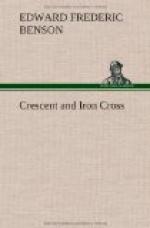Ever since the Osmanlis came out of remoter Asia into the Nearer East and into Europe, the government of their Empire has gone from bad to worse. In the early days, as we have seen, their policy was to absorb the strength of their subject peoples by incorporating the youth of them into the Turkish army, by giving them Turkish wives, and by converting them to Mohammedanism. Such was the foundation of the Empire and such its growth. But having absorbed their strength, the Sultan’s Government neglected them until they milked them again. They were allowed to prosper if they could: all that was demanded of them was a toll of their strength. They were cattle, and for the right to graze on Turkish lands they paid back a pail of their milk of manhood. But an empire founded on such principles contains within it active and prolific seeds of decay, and, as we have seen, more stringent measures had to be resorted to in order to preserve the supremacy of the ruling people. Instead of absorbing their strength, Abdul Hamid hit upon the new method of killing them, so that the Turks should still maintain their domination. And the policy set on foot by him was developed but a few years ago into a scheme of slaughter, which in atrocity has far surpassed the killings of Attila, of whom the Nationalist poet sings, or even the designs of the deposed Sultan. The Armenian nation, with the exception of such part of it as has escaped into Russian territory, has been exterminated, and similar measures have been planned and indeed begun, against the Greeks, the Arabs, and the Jews.
In consequence of this, in consequence also of the European War, the policy of the Balance of Power as regards Turkey has been at length abandoned. The Allies have definitely declared in their joint note to President Wilson their aims in the war, and for those they have pledged themselves to fight until final and complete victory wreathes their arms. Among these aims are:—




